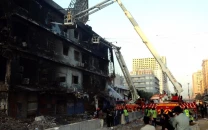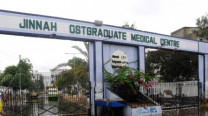Analysis: In the upcoming elections, the playing field may be ‘level’ but not for all
Nearly all political leaders in the country are facing security threats during their campaigns

The apex court order to clean up the city’s no-go areas in seven days is an indication that the ‘level playing field’ has not been prepared.
The intelligence agencies have already alerted some party chiefs, including Bilawal Bhutto, President Asif Ali Zardari, Dr Farooq Sattar and Asfandyar Wali, about possible threats to their lives. They have been advised to refrain from leading rallies or public meetings - an act which stands contrary to the Election Commission of Pakistan’s (ECP) promise of providing everyone a ‘level playing field’.
Though the ECP has already engaged the Pakistan army, Frontier Constabulary, the Rangers and the police but continued attacks on these forces have made the situation quite alarming to hold “terror-free” elections. Only last week, on April 3, there was an attack outside the paramilitary complex in Karachi that resulted in the death of four Rangers’ men. Dozens of policemen have already been killed in the recent attacks, making election security quite a challenge.
On April 2, a Pakistan Peoples Party (PPP) candidate was killed in Orangi Town while an Awami National Party (ANP) leader was killed in Bannu. The two parties along with the Muttahida Qaumi Movement (MQM) are particularly under direct threat, but leaders of other parties are not very safe either.

ANP president Asfandyar Wali, who will be contesting from his home constituency in Charsadda, is also finding it extremely difficult to go out in the public. He will be using video links to address the public that certainly gives an advantage to his opponents. Other ANP leaders, such as Ghulam Ahmad Bilor, Mian Iftikhar Hussain and others, are also facing similar issues.
MQM’s chief campaigners, Dr Farooq Sattar and Haider Abbas Rizvi - the two firebrand speakers - are also facing ‘security issues’, making the party campaign quite challenging. Baloch National Party’s Sardar Akhtar Mengal also feared it would be difficult for them to carry their campaign. Besides, former General (retd) Pervez Musharraf, too has been told not to campaign and restrict himself to closed-door meetings.
It was these threats that forced the PPP leadership to cancel their most prestigious jalsa on April 4 - the eve of the death anniversary of its founder Zulfikar Ali Bhutto. Instead, Bilawal Bhutto and President Zardari addressed a small ‘in-house’ gathering.
With the security forces admitting before the Supreme Court about the presence of no-go areas in the city - and believe me there are quite a few - how can the ECP ensure a level playing field? The Tehreek-e-Taliban Pakistan (TTP), which claimed the responsibility of the attack on Rangers, earlier advised the supporters of these political parties to avoid public meetings and rallies. The three parties that the TTP excluded in its list of parties to negotiate with in February, clarified who the main targets are.
Nevertheless, these parties participated in Jamiat-e-Ulema Islam - Fazlur Rehman’s All Parties Conference and supported negotiations with the TTP. If the voters fail to turn up at rallies and public meetings, or polling booths for that matter, either due to fear or caution, can the elections really be called free and fair?
The apex court order to clean up the city’s no-go areas in seven days is an indication that the ‘level playing field’ has not been prepared. The ECP has identified over 100 most sensitive constituencies where they need the army’s support.
The 2008 elections were held despite the assassination of former prime minister Benazir Bhutto, but that was because she was the only one facing security threats five years ago. Today, almost all the main political leaders are facing difficulties. It seems the parties will contest the upcoming elections but the playing field may not be ‘level’.
Published in The Express Tribune, April 10th, 2013.



















COMMENTS
Comments are moderated and generally will be posted if they are on-topic and not abusive.
For more information, please see our Comments FAQ